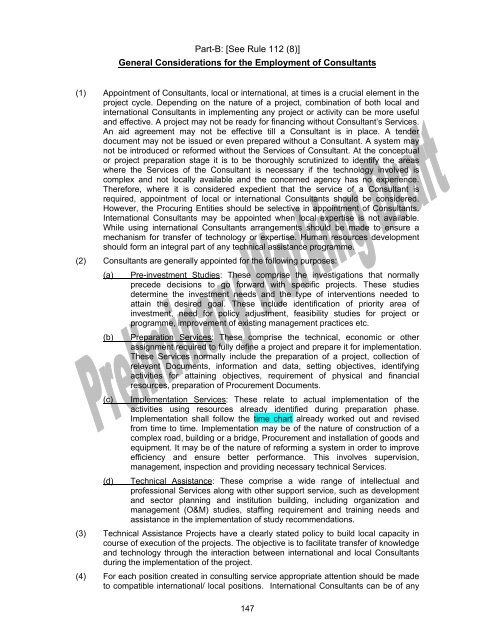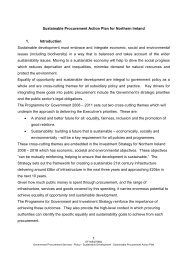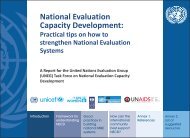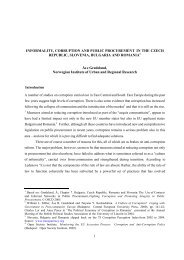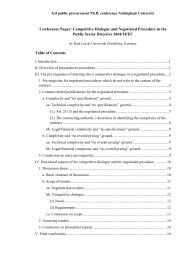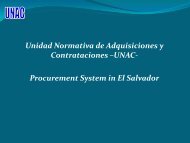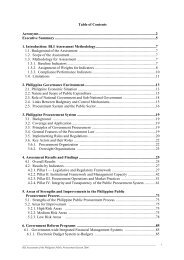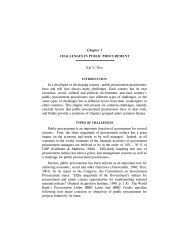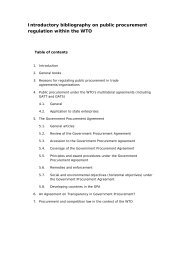The Public Procurement Rules 2008 - LGED
The Public Procurement Rules 2008 - LGED
The Public Procurement Rules 2008 - LGED
Create successful ePaper yourself
Turn your PDF publications into a flip-book with our unique Google optimized e-Paper software.
Part-B: [See Rule 112 (8)]<br />
General Considerations for the Employment of Consultants<br />
(1) Appointment of Consultants, local or international, at times is a crucial element in the<br />
project cycle. Depending on the nature of a project, combination of both local and<br />
international Consultants in implementing any project or activity can be more useful<br />
and effective. A project may not be ready for financing without Consultant’s Services.<br />
An aid agreement may not be effective till a Consultant is in place. A tender<br />
document may not be issued or even prepared without a Consultant. A system may<br />
not be introduced or reformed without the Services of Consultant. At the conceptual<br />
or project preparation stage it is to be thoroughly scrutinized to identify the areas<br />
where the Services of the Consultant is necessary if the technology involved is<br />
complex and not locally available and the concerned agency has no experience.<br />
<strong>The</strong>refore, where it is considered expedient that the service of a Consultant is<br />
required, appointment of local or international Consultants should be considered.<br />
However, the Procuring Entities should be selective in appointment of Consultants.<br />
International Consultants may be appointed when local expertise is not available.<br />
While using international Consultants arrangements should be made to ensure a<br />
mechanism for transfer of technology or expertise. Human resources development<br />
should form an integral part of any technical assistance programme.<br />
(2) Consultants are generally appointed for the following purposes:<br />
(a) Pre-investment Studies: <strong>The</strong>se comprise the investigations that normally<br />
precede decisions to go forward with specific projects. <strong>The</strong>se studies<br />
determine the investment needs and the type of interventions needed to<br />
attain the desired goal. <strong>The</strong>se include identification of priority area of<br />
investment, need for policy adjustment, feasibility studies for project or<br />
programme, improvement of existing management practices etc.<br />
(b) Preparation Services: <strong>The</strong>se comprise the technical, economic or other<br />
assignment required to fully define a project and prepare it for implementation.<br />
<strong>The</strong>se Services normally include the preparation of a project, collection of<br />
relevant Documents, information and data, setting objectives, identifying<br />
activities for attaining objectives, requirement of physical and financial<br />
resources, preparation of <strong>Procurement</strong> Documents.<br />
(c) Implementation Services: <strong>The</strong>se relate to actual implementation of the<br />
activities using resources already identified during preparation phase.<br />
Implementation shall follow the time chart already worked out and revised<br />
from time to time. Implementation may be of the nature of construction of a<br />
complex road, building or a bridge, <strong>Procurement</strong> and installation of goods and<br />
equipment. It may be of the nature of reforming a system in order to improve<br />
efficiency and ensure better performance. This involves supervision,<br />
management, inspection and providing necessary technical Services.<br />
(d) Technical Assistance: <strong>The</strong>se comprise a wide range of intellectual and<br />
professional Services along with other support service, such as development<br />
and sector planning and institution building, including organization and<br />
management (O&M) studies, staffing requirement and training needs and<br />
assistance in the implementation of study recommendations.<br />
(3) Technical Assistance Projects have a clearly stated policy to build local capacity in<br />
course of execution of the projects. <strong>The</strong> objective is to facilitate transfer of knowledge<br />
and technology through the interaction between international and local Consultants<br />
during the implementation of the project.<br />
(4) For each position created in consulting service appropriate attention should be made<br />
to compatible international/ local positions. International Consultants can be of any<br />
147


